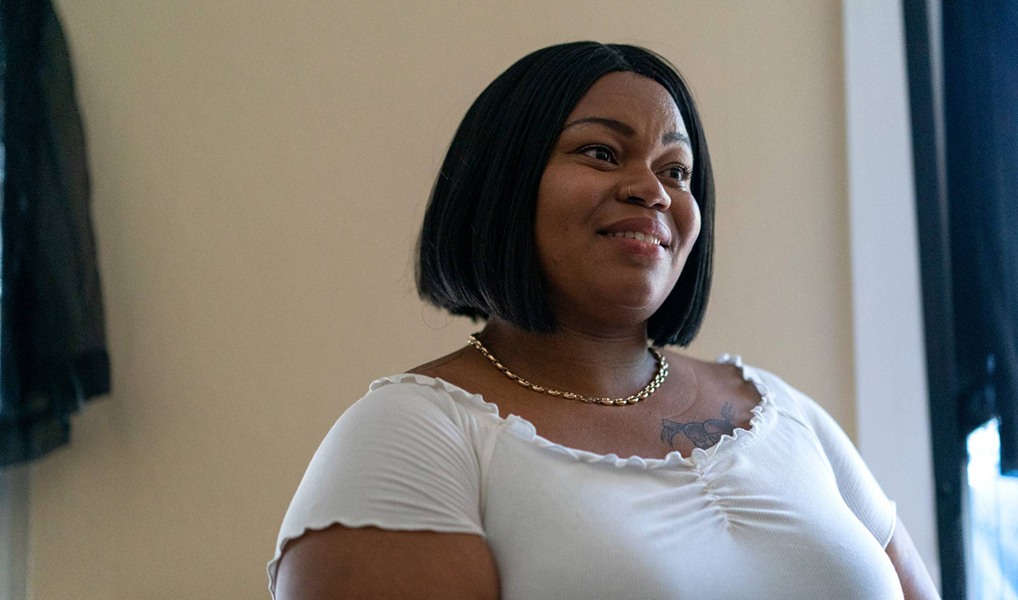
In 2019, members of the Clinton Global Initiative committed to support 30 home construction projects designed to help St. John’s residents, like Adele Thomas, return to stable living situations, and to help rebuild components of their homes better than their pre-storm conditions. Photo taken in 2019.
NEW YORK, NY — Following the devastation of the 2017 hurricane season, local leaders in the Caribbean approached President Bill Clinton and asked him to help the region build back better. In response to this call, the Clinton Foundation launched the CGI Action Network on Post-Disaster Recovery, premised on the notion that everyone has a role to play and we all do better when we work together.
Through this network, leaders from government, business, and civil society come together around shared goals. They work to identify specific needs in the region and develop solutions that can address those needs. Together, these organizations are addressing topics ranging from water and food security to infrastructure and mental health care. The CGI Action Network’s approach is to regularly convene members to identify new projects, share support and resources, and broker unlikely partnerships that will improve response, recovery, and resiliency efforts across the Caribbean.
Meet just a few members of this community who are teaming up to expand hurricane response and build back better.
Rebuilding homes in St. John that were damaged by Hurricanes Irma and Maria
Love City Strong and partners committed to support 30 home construction projects designed to help St. John’s residents. [Video produced in 2019]
When the hurricanes struck St. John, many families and communities lost their homes. Adele Thomas was among them — born and raised in the area, she lived in the house her grandfather built. During Hurricane Irma, much of her home was destroyed.
In 2019, Love City Strong and its partners committed to support 30 home construction projects designed to help St. John’s residents, like Thomas, return to stable living situations, and to help rebuild components of their homes better than their pre-storm conditions.
“It really means a lot to me because this family has been in this home for so many years, and people gave me the opportunity to leave,” says Thomas. “Even though I didn’t have anything, I stayed right here. I didn’t leave. That’s how much, you know, I want to keep what my grandfather put together. I want to keep that going for my kids because family is so important to me.”
Restoring medical facilities in Dominica — and providing training opportunities for nurses and emergency professionals
Medical Professionals on a Mission, Inc., in partnership with Direct Relief, has restored a medical training facility and provided equipment to train nursing students at Dominica State College. Courtesy: Medical Professionals on a Mission, Inc. [2019]
Two years after the storms, Dominica faced a critical need for more medical professionals and more training opportunities for nurses and emergency personnel. Prior to the disaster, a skills laboratory at Dominica State College was an integral part of nurses’ training, but the facility was badly damaged during Hurricane Maria.
To help address this challenge, Medical Professionals on a Mission, Inc. (MPOM), in partnership with Direct Relief, has restored a medical training facility and provided equipment to train nursing students at Dominica State College, including renovating the lab and equipping it with storage, library, and workspaces including CPR mannequins, lab supplies, hospital beds, a hands-free sink, and more.
“Prior to Hurricane Maria, there was a skills lab, but most of the equipment was destroyed,” says Professor Julie Frampton. “This effort has greatly improved the ability of the students to perform in the clinic area.”
Expanding access to nutritious food and reducing food waste in Puerto Rico
Nilus, in partnership with World Central Kitchen and Marriott, made a commitment to rescue 25 tons of food each month and deliver it to the Puerto Rican communities that need it most. Courtesy: Nilus [2019]
In Puerto Rico, malnutrition — which is predominately due to lack of access to nutritious food — is a significant cause of mortality. Many in the region struggle with food insecurity and a lack of sustainable options.
To meet this challenge, some believe a solution lies in mobile technology. “In all countries, there is a loss and waste of food,” explains Karina Campos, the co-founder and chief operating officer at Nilus, a mobile application that uses geographic data to rescue and distribute food. “In Latin America and the Caribbean, about 55% of fruits and vegetables go to waste. Puerto Rico is no exception.”
With this challenge in mind, the team at Nilus made a commitment to rescue 25 tons of food each month and deliver it to the Puerto Rican communities that need it most. This new collaboration with World Central Kitchen and Marriott marks an expansion of Nilus’ successful food rescue program in other communities.
As the commitment grows, the team is dedicated to helping the region. “The Nilus team is putting all of their energy and passion to help low-income Puerto Ricans have more vegetables, fruits, and more quality food in their dishes,” says Campos.




